Key takeaways:
- Understanding personal energy needs and planning meals, hydration, and snacks is essential for sustaining energy during long events.
- Incorporating regular breaks, mindful techniques, and rest improves focus and mental clarity throughout the day.
- Mental strategies like visualization, breaking tasks into smaller chunks, and using positive affirmations can enhance engagement and motivation.
- Self-assessment of energy levels and body language helps identify when to recharge for optimal performance.
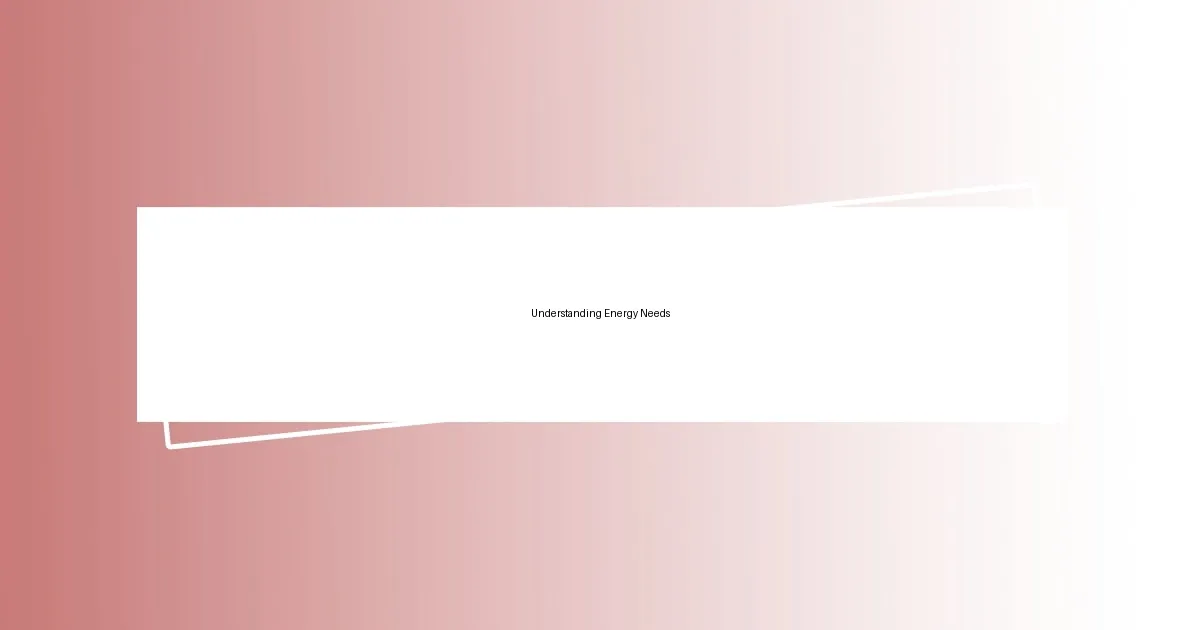
Understanding Energy Needs
Understanding your energy needs is crucial, especially when preparing for long events. I remember a particularly taxing conference where I started the day feeling energetic but quickly hit a wall by noon. Have you ever felt that sudden fatigue creeping in, making you question if you’ll make it through the day?
Everyone has unique energy requirements based on factors like age, activity level, and overall health. I learned this the hard way after neglecting to eat breakfast before a marathon meeting. The slump I felt was a stark reminder that fueling my body is non-negotiable. It’s important to recognize these patterns—when do you feel most energized, and when do you start to tire?
As I’ve navigated various long events, I’ve discovered that hydration plays a substantial role in maintaining my energy. I vividly recall feeling sluggish after neglecting to sip water during an all-day workshop; each hour felt heavier. Have you considered how a simple glass of water can turn your day around? Understanding and acknowledging your body’s signals is the first step to unlocking sustained energy.
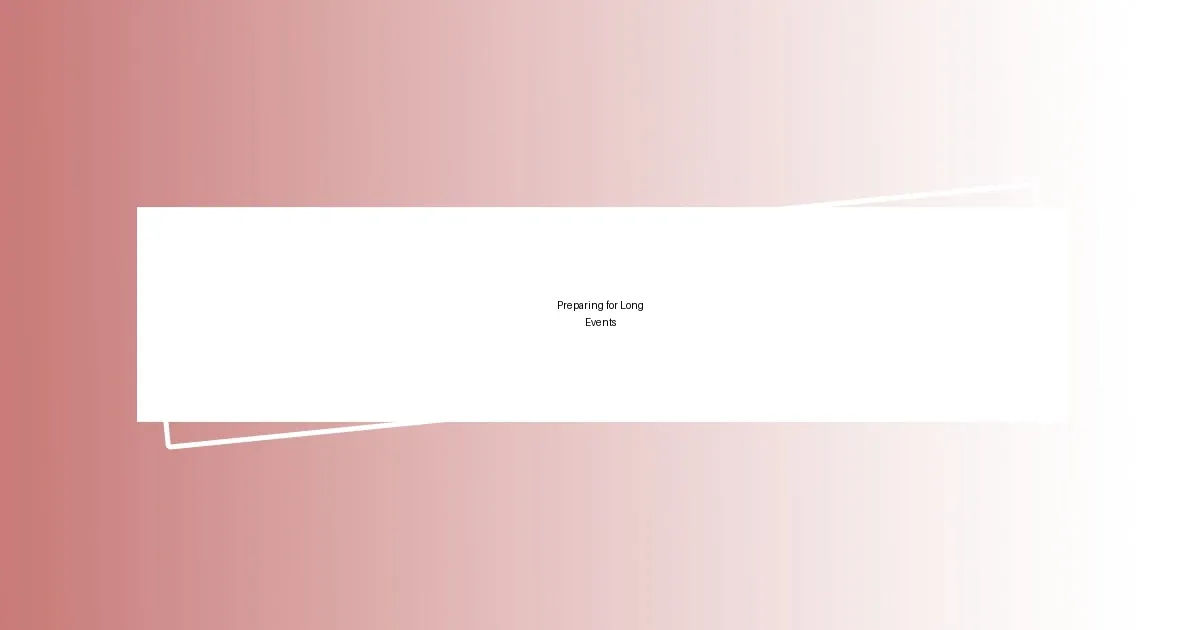
Preparing for Long Events
Preparing for long events requires thoughtful planning and consideration of your personal energy management strategies. I distinctly remember gearing up for a full-day seminar, packing my bag with healthy snacks and a water bottle. That day, I promised myself I wouldn’t fall into the familiar trap of poor energy maintenance. Good preparation made all the difference; I felt alert and engaged throughout the event.
Here are some essential steps I take to prepare for long events:
- Plan Balanced Meals: Prioritize nutritious meals that combine protein, healthy fats, and complex carbohydrates. I usually make sure to include snacks such as nuts or fruit to keep my energy steady.
- Stay Hydrated: Hydration is key. I carry a refillable water bottle and make a point to sip water regularly, even when I don’t feel thirsty.
- Prioritize Sleep: A good night’s sleep can work wonders. I try to rest well the night before the event so that I start off invigorated.
- Create a Comfort Kit: I put together a small kit with items like mints, a portable charger, and a light jacket. This ensures I’m comfortable and can focus fully on the event without distractions.
- Set Realistic Expectations: I remind myself that it’s okay not to have the same energy level all day. Acknowledging this helps me pace myself and enjoy the experience without feeling overwhelmed.
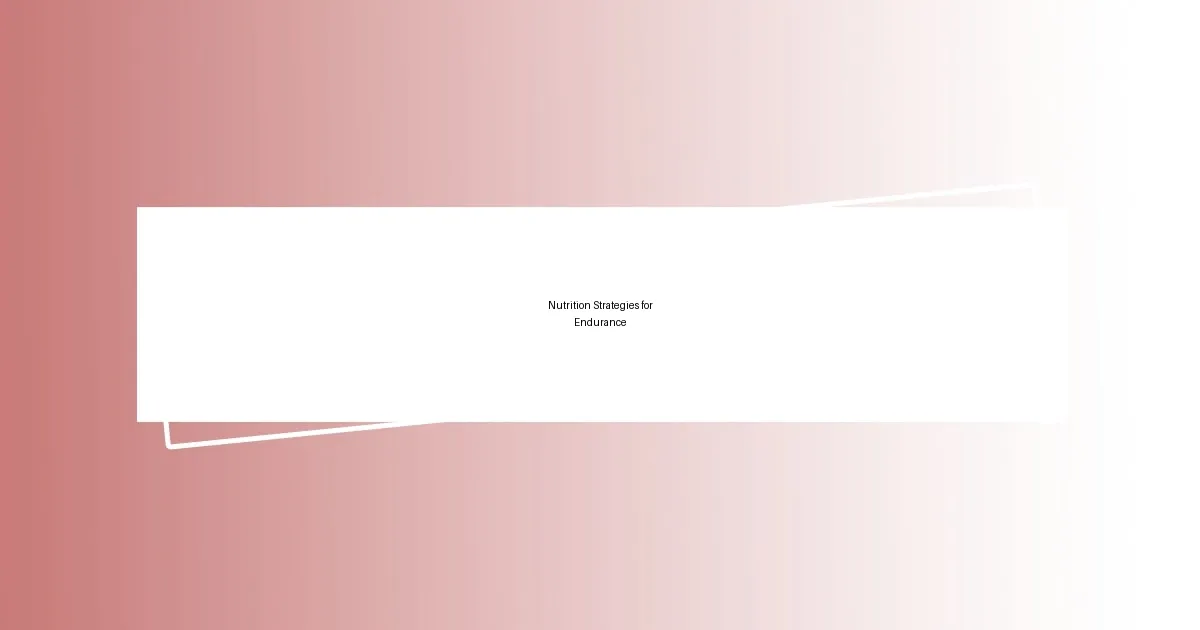
Nutrition Strategies for Endurance
Nourishing your body effectively can significantly impact endurance during long events. I’ve experimented with various foods, and I’ve found that meals rich in carbohydrates—like whole grains and fruits—really keep my energy levels steady. For instance, one time I opted for a quinoa salad loaded with veggies before a long seminar, and I felt light yet energized throughout the day. Have you considered how what you eat before an event can shift your entire experience?
It’s essential to incorporate snacks that provide quick energy. I often pack energy bars or yogurt-covered raisins in my bag. These bite-sized treats not only satisfy my sweet tooth but also deliver the necessary fuel during those midday slumps. During my last day-long workshop, I reached for my stash during a break, which instantly boosted my focus for the next session. Have you thought about your go-to snacks for an energy push?
Finally, I’ve learned the importance of timing my nutrition. Eating smaller, frequent meals rather than a large one can help maintain my stamina. Before a lengthy event, I usually eat every few hours to keep my metabolism humming. One time, I tried to power through without snacking, and I ended up feeling drained and distracted. That experience taught me the value of having a structured meal plan that aligns with event timings.
| Food Type | Benefit |
|---|---|
| Complex Carbohydrates | Provide sustained energy and prevent fatigue |
| Protein | Supports muscle repair and keeps you full |
| Healthy Fats | Offers long-lasting energy without spikes in blood sugar |
| Fruits | Quick source of energy with hydration |
| Snacks | Helps maintain focus and energy between meals |
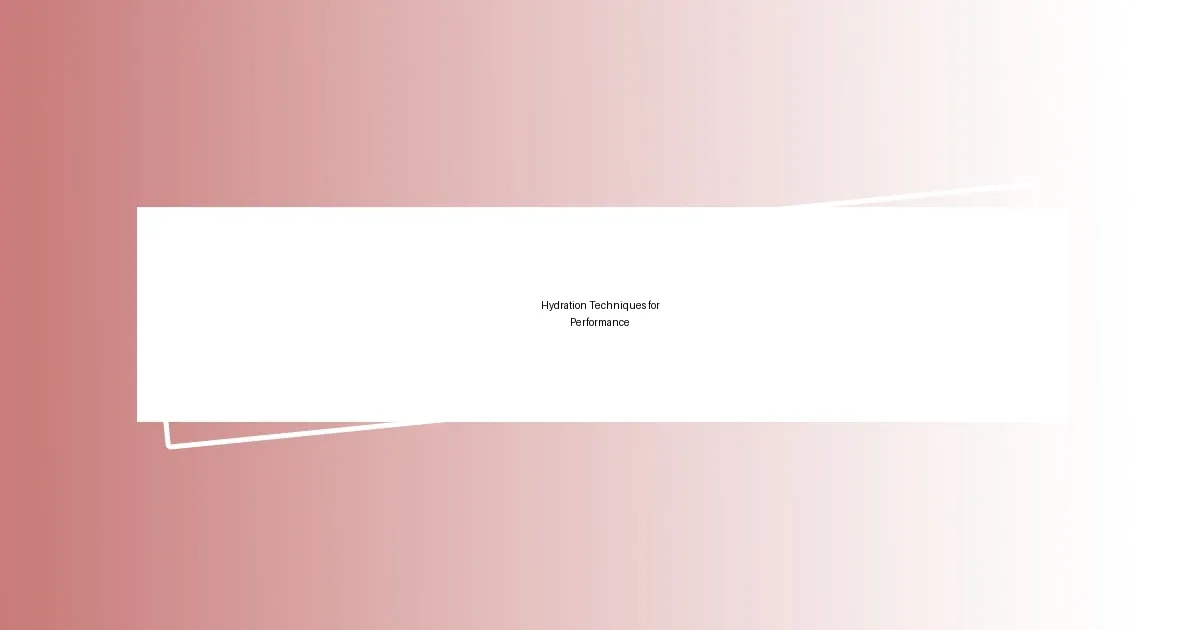
Hydration Techniques for Performance
Hydration techniques can truly transform how you feel during long events. Personally, I’ve discovered that sipping water consistently, rather than chugging large amounts infrequently, keeps me feeling alert. There was a time when I underestimated this, and I found myself feeling sluggish and unfocused by mid-afternoon. Have you ever hit a wall during an event and realized it was due to lack of hydration?
In addition to plain water, I often infuse my drinks with electrolyte-rich options like coconut water or homemade sports drinks. The slight sweetness and added minerals not only rehydrate me but also provide a pleasant boost. I remember a particularly exhausting conference where I experimented with this method, and it made a noticeable difference. I felt sharper and more engaged, almost as if the cloudiness started to lift. Can you think of a time when a simple switch made a big impact on your energy levels?
Furthermore, I find it helpful to set reminders on my phone to drink water at regular intervals. It may sound simple, but those little nudges keep hydration top of mind, ensuring I don’t get caught up in the event and neglect this essential aspect. During a recent all-day workshop, those reminders became my lifeline; I felt energized and ready to tackle each session. Honestly, isn’t it fascinating how something as basic as hydration can have such a profound effect on our performance?
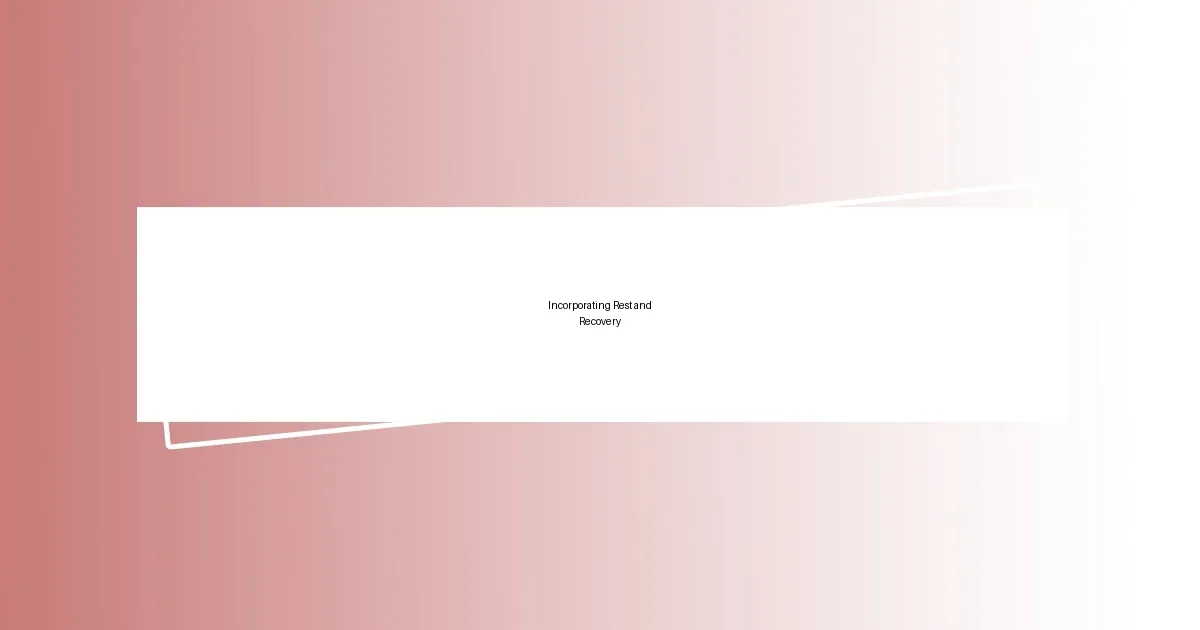
Incorporating Rest and Recovery
Incorporating moments of rest and recovery into lengthy events is crucial for maintaining energy. From my experience, even short breaks where I simply step outside to get some fresh air can work wonders for my focus and mental clarity. I recall a long seminar where I took just five minutes to stretch and breathe deeply; it felt like hitting a reset button. Have you ever noticed how a brief pause can shift your energy?
It’s not just about physical rest, either. I’ve found that even a quick mindfulness exercise or deep breathing can reinvigorate me during overwhelming stretches. When I attended a marathon training session, I took a moment to close my eyes and visualize my goals. That little mental break gave me the emotional boost I needed to push through fatigue. Have you tried any mental techniques to recharge during intense periods?
Planning specific downtimes has also made a difference for me. I now schedule short breaks between sessions, ensuring I have time to step away and recharge. One time, I didn’t do this during a back-to-back workshop, and I felt mentally drained by the end. That taught me that rest isn’t just a luxury—it’s a necessity for sustaining performance. How do you incorporate recovery into your long events?
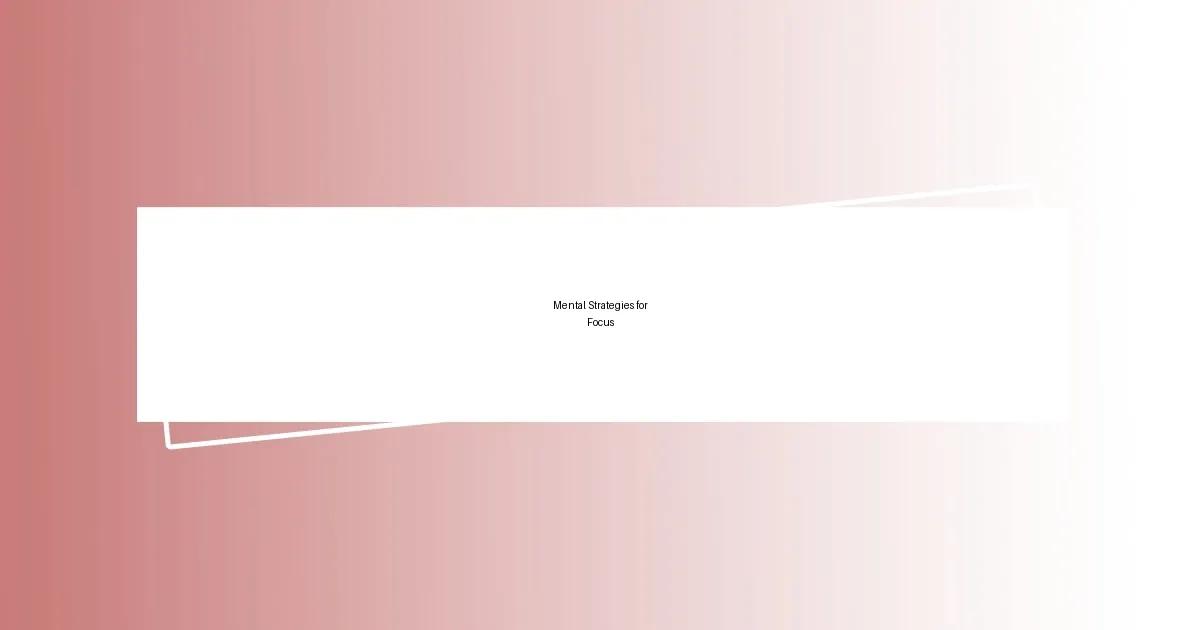
Mental Strategies for Focus
I’ve come to realize that mental strategies are just as crucial as physical ones when it comes to maintaining focus during long events. One technique I often use is visualization. Before a big presentation, I take a moment to close my eyes and picture myself not only succeeding but being fully engaged with my audience. This practice transforms my nerves into excitement and anticipation. Have you ever tried visualizing success before a crucial moment?
Another effective strategy is to break tasks down into smaller, manageable chunks. During an extensive workshop, I found myself overwhelmed just looking at the lengthy agenda. By focusing on one session at a time, I alleviated that pressure and allowed myself to engage more fully. The sessions became less daunting, and I felt my enthusiasm build with each accomplishment. Doesn’t it feel rewarding when you can check off smaller tasks instead of tackling an entire day in one go?
Lastly, I’ve discovered the power of positive affirmations to keep my mindset on track. During a particularly grueling event, I repeated simple phrases like “I am energized” and “I am focused” to myself. Surprisingly, these affirmations helped shift my energy and kept my mind from wandering. It’s amazing how a few positive words can uplift your spirit when the day feels endless. Have you ever thought about how your inner dialogue shapes your experience in such moments?
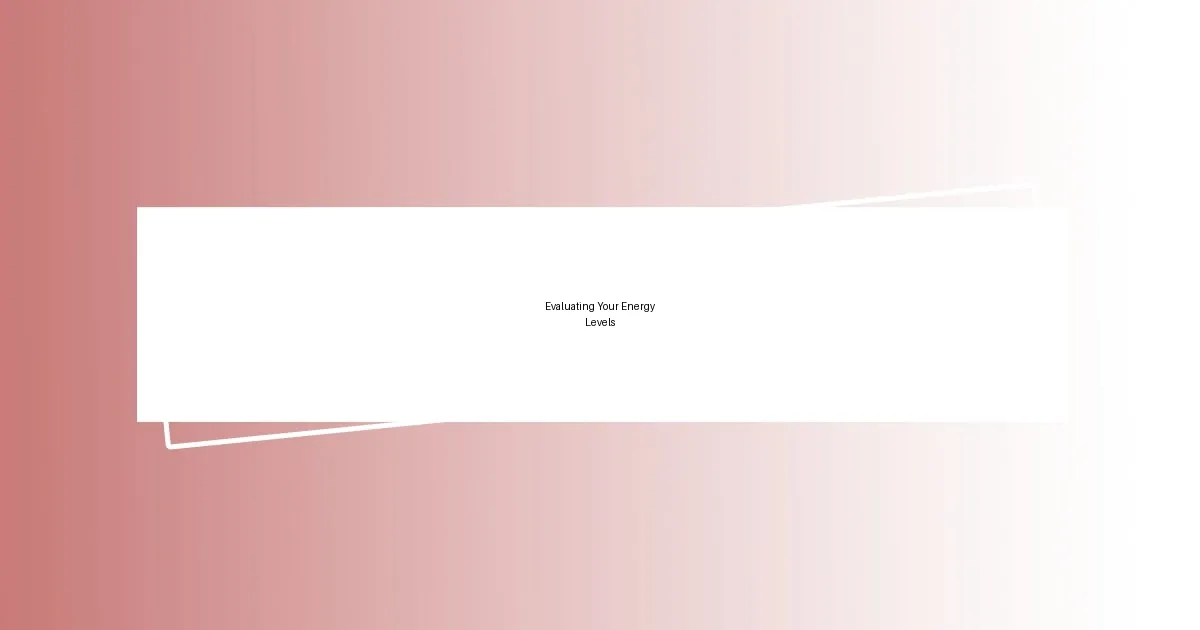
Evaluating Your Energy Levels
When I evaluate my energy levels, I often check in with myself throughout the event. For instance, during a full-day conference, I periodically ask, “How do I feel right now?” This simple question helps me gauge if I’m riding a high wave of energy or if I’m starting to drift. By recognizing those shifts, I can make smarter choices about when to take a break or grab a refreshing drink. Has this kind of self-assessment helped you in maintaining focus?
I also pay attention to my body language as a clue to my energy state. If I catch myself slouching or feeling heavy in my eyelids, I know I’m running low. One memorable experience was during a weekend workshop; I noticed my posture faltering and quickly stood up to stretch. That change in position revived my spirit and encouraged me to re-engage. Don’t you think our bodies give us the most honest feedback if we listen carefully?
Finally, I find it invaluable to notice the emotions tied to my energy levels. I remember a day when excitement fueled my energy as I dove into new topics, but by midday, boredom crept in, and so did fatigue. Recognizing this emotional shift inspired me to switch my focus to a discussion I was passionate about. It’s fascinating how our feelings can either propel us forward or weigh us down. How do you connect your emotional state with your energy during long events?














